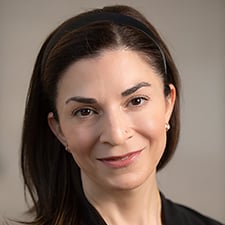As a medical student, do you ever wonder what it’s like to specialize in colon and rectal surgery? Meet AMA member Anne Mongiu, MD, a colon and rectal surgeon and a featured physician in the AMA’s “Shadow Me” Specialty Series, which offers advice directly from physicians about life in their specialties. Check out her insights to help determine whether a career in colon and rectal surgery might be a good fit for you.
The AMA’s Specialty Guide simplifies medical students’ specialty selection process, highlights major specialties, details training information, and provides access to related association information. It is produced by FREIDA™, the AMA Residency & Fellowship Database®.
Learn more with the AMA about the medical specialty of colon and rectal surgery.
“Shadowing” Dr. Mongiu
Specialty: Colon and rectal surgery.
Practice setting: Academic medical practice.
Employment type: University hospital.
Years in practice: Three.
A typical day and week in my practice: My typical work week is operating on Mondays and Thursdays. One of those days is usually large abdominal robotic cases. The other is small anal or rectal surgeries. Tuesdays and Wednesdays I see patients in clinic. Fridays are my academic days and I try to work on research and administrative duties that I have at the university. Hours depend on whether or not I am on call. Clinic days are from 7:30 a.m. until 5 or 6 p.m., while operating days can go late into the evening, depending on the case.
The most challenging and rewarding aspects of colon and rectal surgery: Meeting patients where they are and helping get them to better health, whether it’s a cure for cancer or benign colon disease. Often patients have bad disease as well as other concomitant problems like alcohol or drug abuse, social issues such as homelessness, or noncompliance with medications. Yet they still need treatment that can be difficult. The rewarding part is when you not only fix their problem, but you also bring them to a better state of health overall.
How life in colon and rectal surgery has been affected by the global pandemic: My practice in Brooklyn was almost completely shut down for a few months because of the pandemic and patients were slow to return to the hospital for fear of contracting COVID-19. At the academic center where I’m at now, that has not been a problem.
The long-term impact the pandemic will have on colon and rectal surgery: Minimal if any. People who have cancer will need surgery to remove it. There is a backlog of patients who did not get a screening colonoscopy during the early months of the pandemic. We are finding some increased volume of cancers right now, so we are a little busier than usual.
Three adjectives to describe the typical colon and rectal surgeon: Funny, patient, resilient.
How my lifestyle matches, or differs from, what I had envisioned: The surgeon lifestyle was adequately represented by my experience in medical school at Northwestern University. It is difficult. The hours are long. You never get to put your phone away even if you’re not on call. That being said, I have the best job in the world. I love being able to help bring patients back to better health whether it is from small anorectal disorders or large colon cancers or benign abdominal disease. Handling long-term patient follow-up, which you rarely see in medical school and residency, is both a joy and a challenge.
Skills every physician in training should have for colon and rectal surgery but won’t be tested for on the board exam: Self-confidence gets you through the toughest surgeries when you really want to doubt yourself and other people may be critical. Also, a high sense of organization as far as your daily routine if you plan to be in academic medicine.
One question physicians in training should ask themselves before pursuing colon and rectal surgery: Are you ready for the commitment that surgery requires? All careers in medicine are challenging. As a surgeon, you have to realize that the hours never really get better after residency. They are different. Rather than being filled with scut work, your days are filled with more meaningful clinical work. You get to do the big cases, but you also shoulder the responsibility when things go badly. A surgeon’s lifestyle will always be one where the job comes first.
Books every medical student interested in colon and rectal surgery should be reading: Diseases of the Colon and Rectum is the journal of our society. They can also be followed on Twitter. Beyond that, I would tell medical students to pick three books that don’t involve medicine at all and read those. The time to start rounding out your life and making space for that begins when you’re in medical school.
The online resource students interested in colon and rectal surgery should follow: Some of my best online resources are the Facebook groups for robotic surgeons. I believe you have to be a practicing physician to be a member of a number of them. We share videos and techniques and I find it extraordinarily helpful for learning. YouTube is also an excellent resource for surgical videos and understanding technique.
Quick insights I would give students who are considering colon and rectal surgery: In any surgical specialty, remember you’re not picking the most glorious cases, you’re also picking the most mundane. Robotic colorectal surgery is amazing, but if you hate hemorrhoids, anal fissures and fistula, colorectal surgery probably isn’t for you. Don’t pick a field based on what you perceive the reimbursement to be, as this is always changing.
The hours are very long in all fields of medicine. Really pick the field which resonates the most with you. And to the best of your ability, pick a field that you think you will still enjoy in 20 years when you have a partner and possibly a family. Really get to know some of the attendings in the field that you are in. See what they do in their spare time and see what they have time to do. See if that resonates with where you envision yourself.




